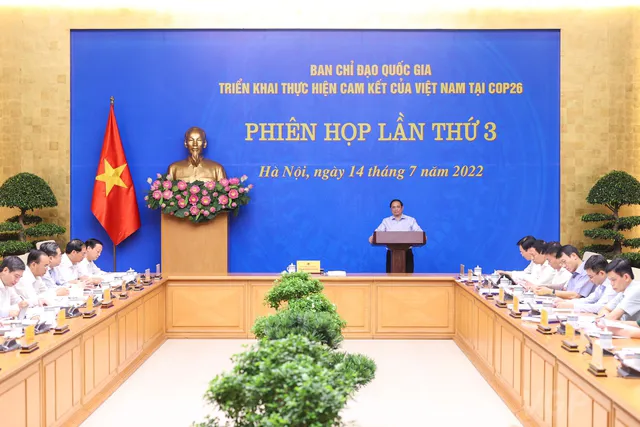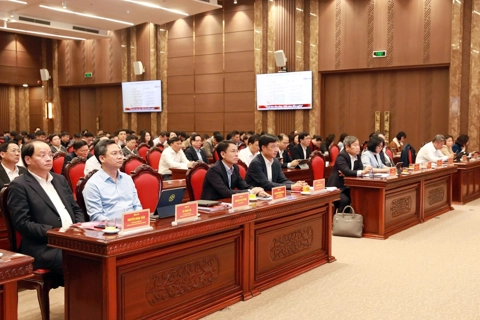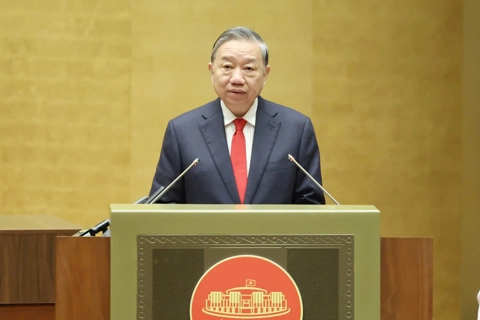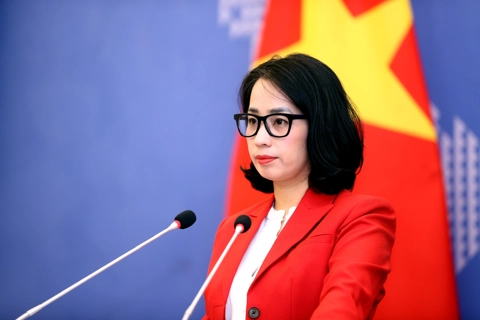Vietnamese PM okays negotiations on G7 climate finance
Climate finance is one of the key approaches to Vietnam’s net-zero path by 2050.
Vietnamese Prime Minister Pham Minh Chinh today [July 14] agreed with negotiation plans and issues of the Just Energy Transition Partnership (JETP) launched by G7 countries for some developing countries, including Vietnam.
| Vietnam's Prime Minister Pham Minh Chinh speaks at the meeting on July 14. Photos: VGP |
To prepare for the next moves, Chinh asked his cabinet members to build a comprehensive strategy for an energy transition that he considered “killing two birds with one stone”, which means it serves both the implementation of international commitments on low carbon emissions and the development of the self-reliant economy.
Chinh made the request at the 3rd conference of the Steering Committee on Implementing Vietnam’s Commitments at COP26, the body he chairs.
In June 2022, G7 (Canada, France, Germany, Italy, Japan, the UK, and the US) announced further support to some developing countries through JETP. The recipient nations include Indonesia, India, Senegal, South Africa, and Vietnam. Vietnam’s low-carbon journey from now until 2050 is estimated to cost US$350-$400 billion.
Regarding climate finance, the State Bank of Vietnam (SBV) said dozens of partners are interested in funding green growth in Vietnam, including the Banking Working Group (BWG) with 30 members which are foreign credit institutions; the French Development Agency (Agence française de développement, AFD); the World Bank Group; and the Asian Development Bank (ADB). Notably, HSBC Vietnam suggested mobilizing financial resources worth up to US$12 billion for Vietnam’s green economy and net-zero emissions in the next 9 years.
At the meeting, Chinh said pursuing low-carbon emissions is an indispensable move in the world focusing on energy transition, which sets new requirements for trade and investment. For that reason, he pointed out specific approaches to Vietnam’s net-zero goal.
It includes prioritizing the target in the country’s development policies and guidelines for state officials, businesses, and people. Climate change response must be made in a just and equal manner globally, requiring the participation of all stakeholders with priorities given to vulnerable groups. In addition, it requires the mobilization of all financial resources and the development of a carbon market with the public-private partnership.
In this regard, the government’s leader asked ministries to join the common drive with specific approaches. Accordingly, the Ministry of Natural Resources and Environment (MONRE) is tasked with submitting concrete measures for the implementation of COP26 commitments.
Meanwhile, other ministries need to submit a project on developing the carbon market, developing clean energy, speeding up digital transformation among businesses, and mobilizing international financial resources.
| Overview of the meeting. |
Foreign experts said Vietnam’s net-zero commitment is an ambitious goal that requires great efforts together with international support.
Commenting on Vietnam’s net-zero target, Chris Wright, Managing Director at Climate Tracker, said told The Hanoi Times that Vietnam’s 2050 net-zero goal is a powerful symbol that it is taking the challenge of climate change seriously.
“It needs to be backed up with detailed plans on what net zero means in Vietnam, and a clear roadmap on how it is going to meet its energy needs going forward,” he said.
Meanwhile, Durand D’souza, a data scientist at Carbon Tracker in the Power & Utilities Team, applauds Vietnam’s ambitious pledge to cut emissions to net-zero by 2050, saying “This commitment tells the world that Vietnam is serious about doing its part to reduce emissions in line with the Paris agreement,” he shared with The Hanoi Times.
“In addition, it is also sending a signal that it is serious about reducing the financial risks associated with coal power and a disorderly transition away from fossil fuels,” said the expert at an independent financial think tank that carries out in-depth analysis on the impact of the energy transition on capital markets, mapping risk, opportunity and the route to a low carbon future.













